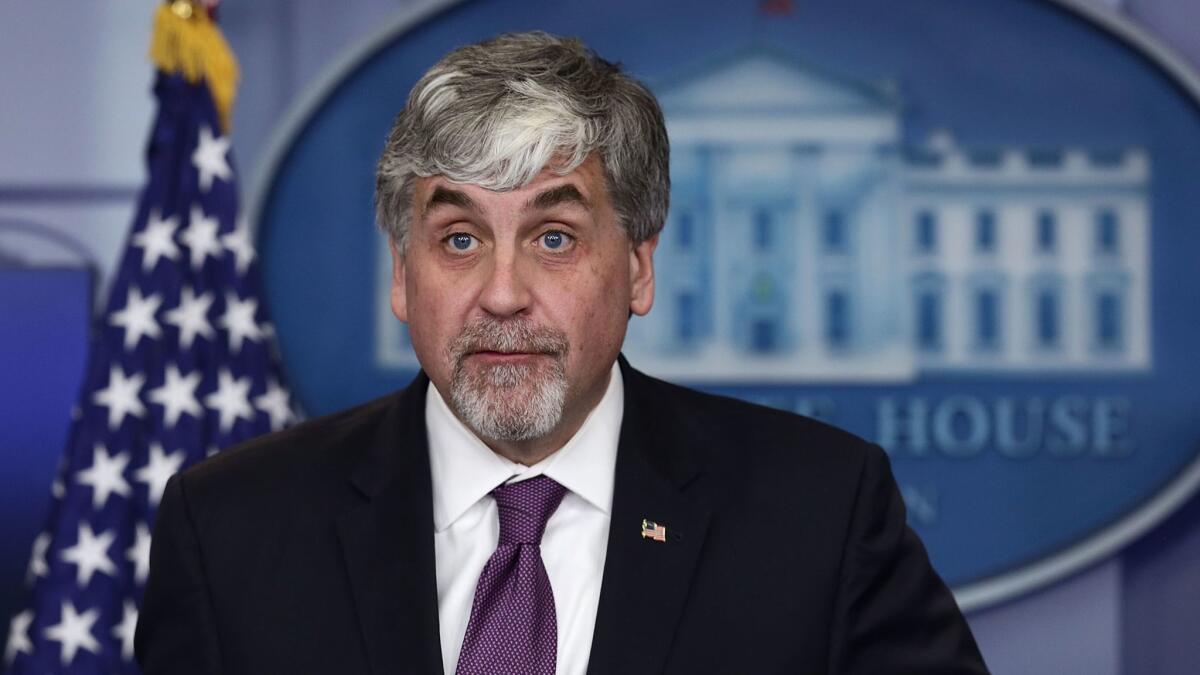Opinion: The Trump administration just found another way to deny women their right to an abortion

- Share via
Doctors who don’t want to assist with abortions, sterilizations or suicides can now turn to a new office within the federal Department of Health and Human Services for help — a “Conscience and Religious Freedom Division,” part of the HHS office tasked with stopping discrimination and privacy violations by federally funded agencies, hospitals and universities.
But what about people who need one of those procedures but can’t find a doctor willing to help? That particular bit of fallout appears to have escaped HHS’ notice.
The Trump administration said Thursday that it established the new division “to restore federal enforcement of our nation’s laws that protect the fundamental and unalienable rights of conscience and religious freedom.” There are, in fact, a handful of federal statutes that explicitly bar Washington and federally funded entities from discriminating against medical facilities or professionals with religious or moral objections to abortions and sterilizations. One — the Affordable Care Act — grants similar protections for those who object to assisting in suicides.
The more hospital administrators and doctors who assert conscience objections, the more likely it will be that women seeking care won’t be able to find it.
So there’s a solid statutory basis for HHS’ move, in the form of laws designed mainly to prevent hospitals, clinics and doctors from being coerced into performing or facilitating abortions. But opponents of the administration’s action worry about a spillover effect that causes some women to be denied crucial, needed care.
Here’s how two physicians groups — the American College of Obstetricians and Gynecologists and Physicians for Reproductive Health — put it:
“We are troubled that the new office announced by HHS could embolden some providers and institutions to discriminate against patients based on the patient’s health care decisions. Denying patient care because of a provider’s personal beliefs can and will have real-world, often life-and-death consequences.
“Abortion, contraception and sterilization are a part of comprehensive reproductive health care and are essential to the health of patients. Professional medical organizations have clear guidance on the issue of refusal, noting that refusals of care must not compromise patient health.”
Abortion opponents have a life-or-death card of their own to play, of course. Still, the administration’s plans ignore how consolidation among hospitals and provider groups, along with narrowing provider networks in many health insurance policies, is leaving many Americans with fewer options for care, especially in rural areas. And consumers may not realize when they sign up for coverage that the hospitals and outpatient clinics in their network refuse to offer certain types of care for religious or moral reasons.
“We have seen these religious refusals result in denial of care,” said Dr. Diane Horvath-Cosper, an OB-GYN in Baltimore and a fellow with Physicians for Reproductive Health. “Certainly the impact is felt by the groups that often have trouble accessing care in general,” such as rural communities, people of color, adolescents and people not covered by an employer’s group health plan.
The ethical codes drawn up by the leading medical associations all hold that the physician’s first duty is to his or her patient, Horvath-Cosper said, and that religious objections cannot result in a patient being left unable to obtain care. Nor can such objections be based on beliefs that run counter to established science.
Finding a middle ground would require those who object to performing or facilitating certain procedures to agree to arrangements that ensure the availability of those procedures for those who seek them. That may be hard to pull off in some parts of the country, given the issues surrounding insurance coverage, provider consolidation and the limited supply of specialists. But absent such arrangements, the more hospital administrators and doctors who assert conscience objections, the more likely it will be that women seeking care won’t be able to find it.
The Trump administration made clear Thursday that it’s not even interested in that half of the equation. If some women should be denied the care they seek, well,
‾\_ツ_/‾.
Twitter: @jcahealey
More to Read
A cure for the common opinion
Get thought-provoking perspectives with our weekly newsletter.
You may occasionally receive promotional content from the Los Angeles Times.







